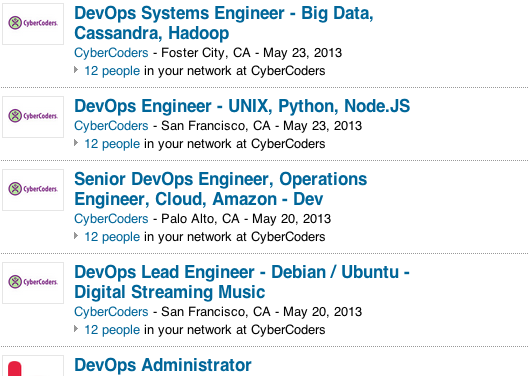I'm not a DevOps...Are you an Agile?
I was signing up for a new MeetUp group a few months ago, and as part of the process, I was supposed to answer a few questions. One of the questions was “Are you a DevOps?”. I was a little struck by this. I’m pretty sure I knew what the question was supposed to mean, but I also know that the question was nonsensical. Maybe a proper rephrasing would have been, “Are you an engineer who works in accordance with DevOps principles?”. Maybe that was just too long and loaded to ask as a question. I feel like we’re starting to lose control of the word “DevOps”. Is that just natural for our industry? Is it a “good thing” or a “bad thing”? Maybe this means that DevOps is gaining adoption, or maybe it means we’ve lost sight of why we’re doing this.

Taking a look at my inbox on any given day and it is filled with job opportunities. We are looking for “DevOps engineers”, or one of my personal favorites “Senior DevOps engineer” or “Lead DevOps engineer”. I feel like sometimes our industry will find some term and then it will get dragged through the mud for a few years until perhaps the proper usage will be found. Take the word “hacker”. When hacker first became popular it referred to someone who like to “hack” on code. Then the press got a hold of the word. After a while, a hacker was someone who tried to break into other’s computer systems. For years, in Hollywood movies, we learned about hackers and their nefarious telnet toner backdoor circuit electron overflows. I had a general counsel once explain to me the concept of “secondary meaning” in legal terms. This is when something that is generally known takes on “secondary meaning” as in the case of Apple. Everyone knew what an apple was when they were growing up, and they were delicious. Eventually, Apple the computer company became so big, that the word apple took on secondary meaning. I feel like this is what happened with the word hacker in our industry. Eventually it took on secondary meaning as a way of describing what folks on Bugtraq for years have been lamenting should have been called “cracker” (oh, the irony) instead. Now we have Hacker Dojos, Hacker Bees, IKEA hackers, and Hacker News. If you read news articles you will still see references to how hackers have infiltrated some government network (with their majicks!), but on the whole, our industry has either reclaimed the term, or allowed its dual usage based on context.
So then what about DevOps Engineers? Has Patrick Dubois, has our industry, already lost control of our own term? I’ve been going to DevOpsDays for years, I’ve been talking to people and giving talks about DevOps, I’ve been trying to help salesforce.com through a DevOps transformation. In none of those interactions have we ever talked about DevOps engineers. When I give my Introduction to DevOps talks, I usually tell the audience to substitute the word “collaboration” where they see the word DevOps and they will be much closer to an instant understanding of what we’re trying to accomplish with DevOps, even if they won’t understand the “why” quite as quickly.
If you’ve ever listened to Gene Kim talk about DevOps, he talks about making life better for thousands of IT professionals. DevOps is definitely about getting rid of the “throw it over the wall” mentality between development and operations, but it’s for the purpose of getting the business to focus on what is most important, being able to rapidly deliver value to the customer. In order to do that, Dev and Ops have to change too. Maybe those changes are a natural evolution. I remember the BOFH. I hope that as an industry, we’ve put that behind us already, we’ve evolved. The idea of a BOFH is antithecal to the DevOps movement. The BOFH said no to everyone, it’s no wonder people did not want to collaborate with him or her.
The BOFH was fine for the days when we used to think it was a good idea to outsource our IT departments, to cut costs. If your development wing is in the Phillipines, and your operations department is in India, and they are run by two completely different companies, it doesn’t matter all that much how well your devs and ops communicate, they don’t! You are already starting behind and will never catch up to companies practicing DevOps. DevOps is not about oursourcing, DevOps is about insourcing. The problem is, no matter how much the engineers in us try to escape it, and turn everything into an algorithm, it still all about people and how they communicate. The DevOps movement is a recognition of that fact. If you’ve ever read Crucial Conversations, a book about communication skills, one of the first concepts they teach you when you are going to have an imporant conversation is to Establish Mutual Purpose. That is DevOps in a nutshell. Development and Operations establishing mutual purpose. In DevOps, that purpose it to deliver the most amount of value to the business through streamlined processes, it’s about always seeking to increase flow. Once that purpose is recognized, you’re much more likely to have a successful conversation, and you’re much more likely to have a successful business.
So, I read with interest the recruiters who write me about the latest DevOps opportunity. I don’t remember a major called ‘recruiting’ in college. The closest I can think of would be sales or marketing. What are these recruiters trying to market or sell? Are they marketing a collaborative environment? Free from BOFHs? Where flow reigns supreme? If that is the case, isn’t every company looking for the exact same thing? Is the word “DevOps” redundant in this case? Is DevOps actually a descriptive differentiator? Should it just be “looking for systems administrator”, “looking for developer who likes to understand the entire architecture”? Or is it more than that? Sometimes I worry that “DevOps engineer”, actually means “sysadmin who understands writing code for automation”. But, after being involved in this industry for many years, that’s just what we’ve always called a “good sysadmin”. Is that what they are marketing? “Serious startup company seeks good systems adminstrator”. I guess it doesn’t have the same cache.
The problem, I suppose, is more than that. Where are these good sysadmins going to come from? Where are these systems thinking developers going to be taught? Traditionally developers might code and sysadmins might troubleshoot. But now, developers are responsible for their code in production (if you wrote it, you run it). Sysadmins write code. Where is the line? Where will the subject matter experts we’re accustomed to come from? I suspect that the industry will simply change. There will be people who naturally gravitate toward one or another aspect or specialization based on their interest or experience. It might be harder to find your traditional QE or Sysadmin. Maybe we’ll be looking for cloud engineers? I don’t want to get started on public vs. private clouds, etc.
So where does that leave us? Obviously, our industry is in transition. Everyone is looking for “DevOps Engineers”. Are you part of a movement that represents the fact that we can deliver more business value when people see delivery through lean principles where the empasis is on flow through the system, and short feedback loops, more than it is upon silos and politics? It’s people over process, a core tenent of the Agile Manifesto. Is that what these recruiters are asking me? Do I believe in people over process? Of course I do, that’s why I believe in Agile. I think the lessons that agile development process teaches us not only make us better developers, network admins, and sysadmins, I think they also make us better as people. The sprint retrospective may be about making the team better through a process of self improvement, but it’s also about a process of remembering to improve ourselves. Any strides that we make a person, as an individual, through better tooling, or better communication, make the team better, and benefit the business.
The sales and marketing folks are definitely having success using the DevOps term. When signing up for the O’Reilly Velocity conference I was asked “Do you primarily work in Web Operations, Web Performance or DevOps?”. Last week on Twitter, Puppetlabs asked “Lots of DevOps jobs out there — and more on the way. How do you become a DevOps engineer & get in on this trend?”. These are from two organizations that defintely “get” DevOps. Maybe the word has already acquired that “secondary meaning”. Maybe we’ll be calling all the jobs that are interesting “DevOps jobs”, until the whole industry is operating with that business model anyway. I just have to imagine that Toyota never advertised for “Kaizen Engineers” to work on the production line.
So when confronted with the question, “Are you a DevOps?” I answered the only way I knew how. Someone was asking me not whether I was qualified to fill a role, but whether I believed in a movement. Whether flow was of the utmost importance. Whether communication was more important than silos. “Of course not, are you an Agile?”
